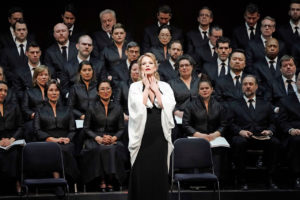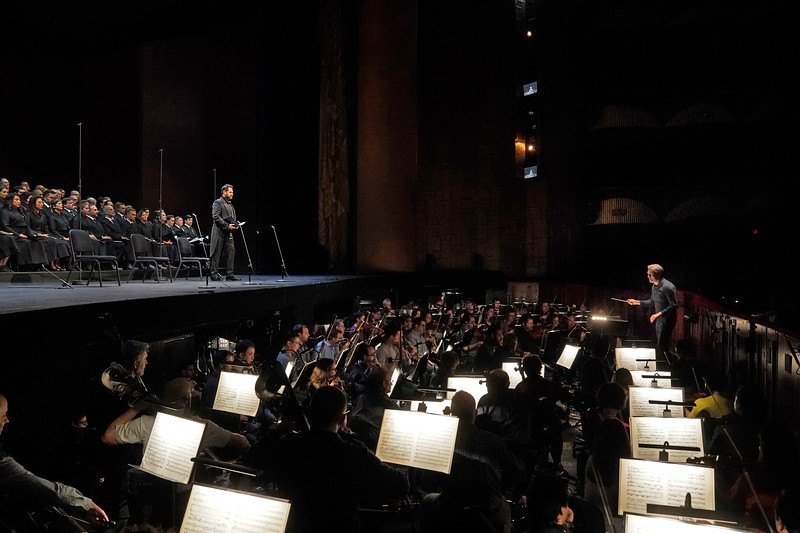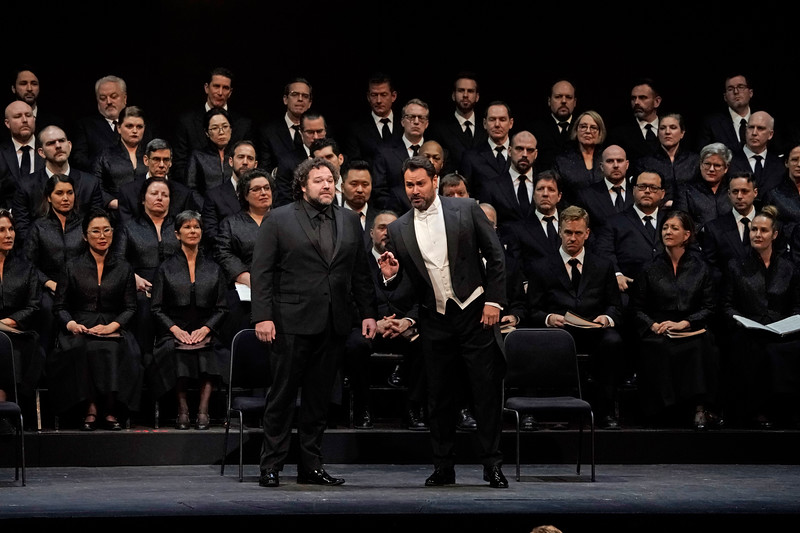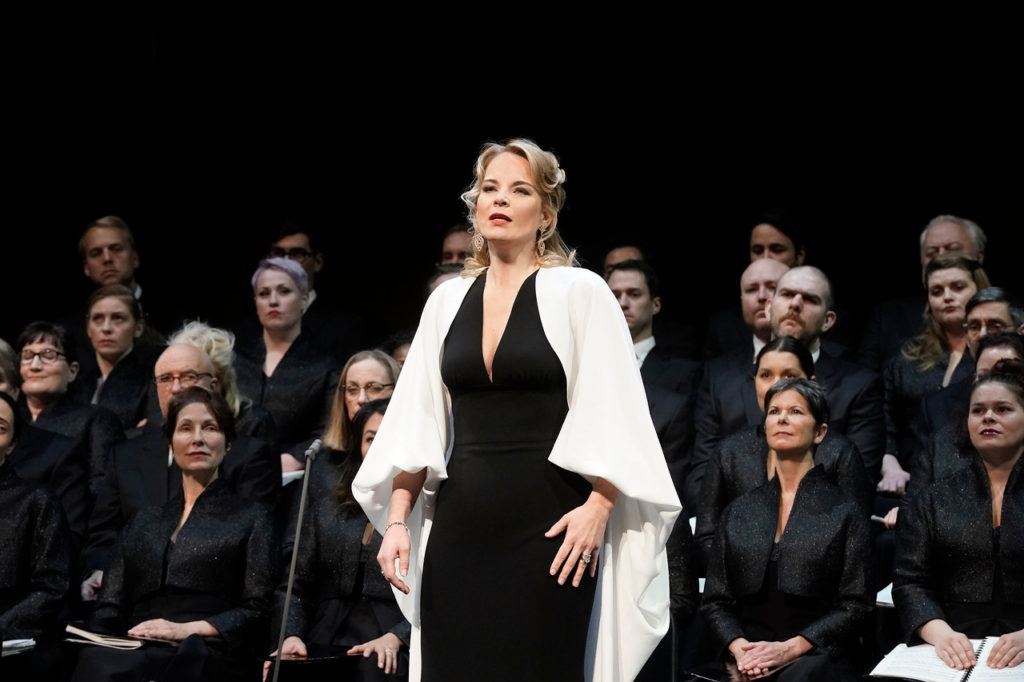
Metropolitan Opera 2019-20 Review: La Damnation de Faust
Elīna Garanča Shines In Stunning Concert Performance of Berlioz’s Glorious Score
By David Salazar***This review has been edited from its original form. A previous version stated that the presentation of the concert version was the result of a “break down of the machine” by Robert LePage, which was incorrect and irresponsibly misinterpreted information on the part of the writer.
Last June, the Metropolitan Opera announced that its upcoming production of “La Damnation de Faust” would be presented in a concert version due to “unanticipated technical demands of reviving the staged production” by Robert LePage that were impossible to accomodate in the busy company schedule; a New York Times article added that “officials realized that they would need to revamp some elements of it to meet newer industry safety standards, refurbish some of its automated mechanical systems, and update video projections that are more than a decade old.”
The production is arguably LePage’s finest operatic creation to date, presenting a truly unique rendition of this glorious piece of music. And yet, despite its absence, the show went on in truly formidable fashion led by conductor Edward Gardner.
Resplendent Color
Despite the black barren stage, or maybe even because of it, Gardner managed to paint a vast canvas full of color as he led the Metropolitan Opera through this masterful score. From the gentle opening strings, to the bombast of the second act’s grand finale, to the celestial end, this was an orchestral performance of truly remarkable quality. First off, the transitions were seamless.
Berlioz tests the orchestral players throughout with major time shifts within choral passages. In just the first act alone, the composer shifts the mood of the piece from a delicate aria to fun-filled chorus and eventually a march that repeats itself extensively; and through it all, not only did Gardner manage to seamlessly connect the diverging movements, but he gave them a sense of shape and build, showing restraint and saving for the biggest climaxes, avoiding the trap of diminishing returns. He easily could have allowed the orchestra to explode at the fortes and then recede excessively during the piano dynamics (as many conductors often do at the Met), but he managed to always find the in-betweens, so as to navigate a truly immersive path through this music.
There was clarity throughout the sections, allowing the listener to truly appreciate the layered orchestration of Berlioz’s work. From adding just a bit more percussion and brass at climaxes of the march, the tapestry of harps in the epilogue, the sheen of the strings throughout, there was a purity in the elegance of the approach that really allowed this music to breathe with color. It was not a mannered interpretation full of lengthy rubati and other overzealous romantic gestures; instead he opted for a more direct interpretation that allowed his freer moments, particularly with the fermatas during woodwind solos throughout Marguerite’s “D’amour l’ardente flame,” to really strike the listener all the more effectively. During the famed horse ride to hell at the end, the music had a tremendous sense of drive and stability with the winds’ interventions seemingly building up the darkness and chaos that would soon engulf Faust; there was a great tension in the music that made the moment aurally but also visually palpable.
That isn’t to say that there weren’t a few trying moments for maestro, particularly in the faster arias with Ildar Abdrazakov where the bass-baritone and conductor didn’t always seem to be on the same page.
Gardner did strike up a solid partnership with the Met Opera Chorus under Donald Palumbo. The chorus is essentially a fourth major character in this drama, shifting from town villagers, to drunks, to demons, to angels from scene to scene. They appear more often than any of the soloists and get some of Berlioz’s most challenging music to boot. But they managed to really deliver a standout showcase that is impossible to forget. Nowhere was the ensemble’s performance more memorable than at the very end where the members of the chorus shift from demons shouting out cryptic dialogue to suddenly becoming angels; the shift from venomous volume to refined purity of sound was executed marvelously, ending the opera in a sea of tranquility.

(Credit: Ken Howard / Metropolitan Opera)
Powerful Men
Bryan Hymel had not been at the Met since a high-profile “Guillaume Tell” a few seasons ago and it was good to have him back in repertory that suits his voice wonderfully. In listening to his turn as Faust, it was impossible not to remember his heroic run of performances in “Les Troyens” in which he relieved Marcello Giordani many years ago. His tenor retains its vibrant luster and ability to fill the house, with a prominent squillo in the upper range. In listening to him there are times when one hears the difficulty of ascending into the tenor’s upper range, though to be fair, this is a part that generally sits in the middle to lower reaches with some of the highest notes coming out of nowhere at times.
His first entrance “La vieil hiver a fait place” featured an elegant legato that would characterize most of his singing throughout the night. There was certain restraint in this aria, but it managed to convey the world-weariness in Faust as a result.
The fugue-like “Sans regrets, j’ai quitté” furthered this sense of loss, the tenor’s voice more present, the building phrases growing with greater intensity on “Je souffre et la nuit sans étoile” before dying into an almost frightened sotto voce on “silence et ses voiles.”
His “Nature immense” was another major highlight, the tenor’s voice expansive and full as it resonated magisterially into the space. The voice soared over the orchestra, building and building to the climactic high G sharps and A on “et d’une âme altéré” with great sense of ease and drive. This was Hymel at his very best.
Less successful was “Merci, doux crepuscule” at the start of the second half. Hymel’s voice managed the phrases quite well and the ppp high A flats on “Que j’ai ce silence” had a piercing beauty with their full-bodied sound. But for whatever reason, the rhythm was all over the place, the tenor not really in synch with the orchestra and the aria ultimately feeling quite messy in overall execution. Things got particularly hairy in the second half of the aria with “O jeune fille,” where the triplet seemed rushed, the orchestra constantly trying to catch up to the tenor. There was also some shakiness of pitch on the final lines, particularly as his voice descended into his lower register.
Hymel also struggled a bit with the first sequence of G#-A-B-C# in the duet with Marguerite on “encore mon amour est vainquer,” the notes sounding overly pushed in this instance; the repetition of this same sequence, this time sung with Garanča, was on solider ground, the voice more resplendent.

(Credit: Ken Howard / Metropolitan Opera)
As Méphistophélèes, Ildar Abdrazakov had a mixed afternoon. He sang the role at the Met almost a decade ago, but his voice has changed significantly in the interim. While he was once a bel canto specialist, he is now more devoted to heavier repertory, particularly in the operas of Verdi. Berlioz’s Méphistophélès requires a voice that can play all the tricks in the book from a booming sound to a light and flighty one. It is arguably the most challenging part in the entire work. And while Abdrazakov strikes gold when his booming bass is allowed ample space and time to let it bloom (nowhere is this more present than in the intoxicating and seductive “Voici des roses”), he was far less successful in passages that require more nimbleness. Exhibit A would be “Une puce gentile” where the line is not only fast but runs up and down the register. Not only did Abdrazakov become inaudible in the lower reaches of his voice throughout this passage, but he seemed overwhelmed by the tempo, the clarity of his pitch and diction far from optimal. It is possible that he missed a few notes on the way. This is far from only on him and seemed more a miscommunication with Gardner as to the right tempo for the piece.
But then there’s Exhibit B, “Devant la maison,” a piece that arguably requires even more vocal flexibility. Again, Abdrazakov seemed a bit overwhelmed by the tempo, never quite managing to find his groove. His voice would become inaudible every time it had to dip from the F sharp to C sharp on “t’adore” and he seemed to overcompensate by singing louder on the higher note, mainly the high C sharp and D natural on “l’aurore.” As the aria progressed, it seemed to get more challenging for him and the line became increasingly frayed. One imagines that in the three subsequent performances these particular challenges will be managed between singer and conductor.
But back to his best moments, especially “Voici des roses,” where Abdrazakov displayed a plush legato line, his voice vibrating powerfully in the space. Each phrase blossomed into the next with the bass climaxing it all with a resplendent E-natural octave leap on “Oreille entendra,” the lyricism at its most impactful in the upper range. He then backed off into a more ominous color on the “écoute les esprits de la terre.” This was the demon at his most spellbinding. There was also a great deal of stoicism in the final scenes, particularly when he proclaimed his victory over Faust. There was no sense of remotest insecurity in these phrases.
As the Brander, Patrick Carfizzi displayed agility in his big number and the following (hilarious) fugue, though he too seemed to lose potency in the parts of the phrase that dipped into his lower voice. Of course, this undoubtedly has more to do with the challenges of the score, given that the piece is placed a bit higher in the voice and moves rather quickly with only a few occasions when it drops into the lower reaches.

(Credit: Ken Howard / Metropolitan Opera)
Star of the Night
Of the four soloists no one had a stronger evening than Elīna Garanča, who delivered not only a technically assured performance throughout, but a musically inspiring one. Take the aria “Autrefois un roi de Thule,” which repeats its main melody not once, but twice for a total of three sections; people often criticize Berlioz for his simplicity of form at times and it is in his repetitions that this is most noticeable. Most mezzo-sopranos will do something with these repetitions to give the music some life, but Garanča’s approach matched the restrained elegance of the maestro. Each section was built up to the F natural quarter note before slowly receding to the E flat fermata, followed by a gentle close to the phrase before the repetition. Each of the three F naturals was stronger than the last with the third one soaring into the auditorium with a thunderous sound; and each corresponding fermata was softer than the last with the rubati right before becoming more expansive and the phrase’s codas also increasingly muted and softer.
It allowed for a sense of deepening mix of melancholy and tension, the musical and emotional push and pull making the aria a fascinating experience. It is always truly mesmerizing when an artist gives the listener enough of a hint as to what they are looking to accomplish without giving it all away immediately; it allows for a special kind of immersion and comradery between listener and artist.
In the duet with Hymel and subsequent trio, Garanča’s voice bloomed gorgeously; in the duet, she matched the tenor phrase for phrase and lifted him up at a climactic moment when they ascended into their upper ranges together.
But there was no doubt that the most spell-binding moment of the entire evening was her breathtakingly sung “D’amour l’ardente flame,” arguably the most renowned passage from the entire opera. Unlike her first aria, “D’amour” has four distinct musical sections, all with differing emotional landscapes that really challenge not only the stamina of the singer, but her expressive abilities. Garanča’s interpretation built on itself, giving a sense of Marguerite’s increasing passion, the mezzo unleashing her voice more and more with every section. If the opening of the aria was dream-like in its delicate approach to the sublime main melody, the second section, “Son depart, son absence” had a tinge of sadness and increased desperation as the tempo pushed forward. The first high G natural on “son pour moi le cercueil” was potent, but it was a far cry from G-A-G sequences during the second section on “enchanters” and “il sait même,” the second of these trio of notes more powerful than the last as her Marguerite’s longing intensified. After a more melancholic reprisal of the main melody, her final “Jes suis à ma fenètre” was unbridled, Garanča’s voice at its fullest potency throughout, allowing the audience to feel the unmatchable force of Marguerite’s passion, There was simply nothing more riveting the entire night in a performance full of captivating turns.
This was the first of four performances, which means that the subsequent three are bound to build on this one. One suspects that those performances will be unforgettable musical experiences that might will be among the best of the Met Opera’s entire 2019-20 season.
Editorial Note: The score utilized for this review was made possible thanks to Nkoda.


